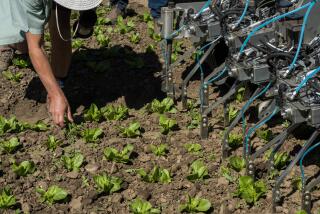Corporations Supplant an Organic World
- Share via
Re “To Feed World’s People, Modern Practices Must Supplant Organic Fads,” Commentary, June 4: Jim Wells’ touting of modern farming practices as a fix for world hunger conveniently excludes two critical issues: 1) the potential consequences that will eventually result from giant agribusinesses’ introduction of hundreds of millions of acres of untested, voluntarily regulated, mutant transgenic organisms (often falsely referred to as “genetically engineered food”) into our already fragile ecosystem; and 2) the attempt to force farmers into what amounts to indentured servitude--raising and harvesting patented mutants for the corporate bottom line while being prohibited from saving seeds for next year’s planting, a 10,000-year-old practice that’s responsible for the majority of fruits and vegetables consumed today.
Instead, the products resulting from our “modern” farm practices (which, so far, have not been engineered for taste, nutrition or longevity but only to either resist the pesticides the patent holder sells or to overproduce inherent, natural pesticides) have been rejected by the European Union, Japan, China and many African countries, among others.
Highlighting the challenges of organic farming is one thing, but to imply that global agri-conglomerates are benevolently striving to end world hunger redefines the word “naive.”
Frank Allen
Los Angeles
*
The dictionary defines the word “fad” as a temporary, popular manner of conduct, enthusiastically followed by a group. Modern agriculture more likely fits the description of fad than organic farming, which has been around for thousands of years. The soil renews itself with organic farming practices, not with the use of pesticides and herbicides--which grow exponentially with the immunity of the critters and weeds they are supposed to eradicate or hold in check. Nature’s laws don’t change--only our understanding of them.
Saran Kirschbaum
Los Angeles
*
Wells is looking ahead to 2050, when we have 9 billion mouths to feed, and he has come to the sensible conclusion that the only way we’ll be able to feed ‘em all is to forgo organic farming in favor of conventional farming--otherwise we’d have to convert wildlife habitat into cropland.
But Jim, what happens then? After we’ve fed 9 billion people and they’ve all had kids--then what? Then we’ll have 12 billion mouths to feed, and when we feed them, we’ll have 16 billion mouths to feed, and on and on.
Our arable lands will shrink and become increasingly less productive, human population will encroach into more and more wild lands, and eventually billions upon billions of us will starve because the planet will no longer be able to support us all.
More food is not the answer. It would be much smarter to start decreasing crop production. We could bring our population to more sustainable levels, give our overstrained topsoils some chance at recovery and reduce famine’s eventual toll exponentially.
Curtis Hannum
Los Angeles






